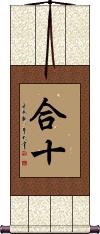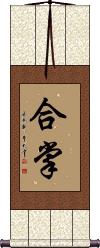Many custom options...
And formats...

Namaste in Chinese / Japanese...
Buy a Namaste calligraphy wall scroll here!
Personalize your custom “Namaste” project by clicking the button next to your favorite “Namaste” title below...
Namaste - Greeting
The word namaste comes from Sanskrit and is a common greeting in the Hindi and Nepali languages exchanged by devout Hindu or Buddhist people in Southern Asia (especially India).
合十 is the Chinese form (not well-known in Japan) of this word which is used to describe a Buddhist (or Hindu) greeting with palms closed together prayerfully, generally at chest level. However, this selection of characters describes the act and is not a word spoken during the greeting. Words or a greeting are seldom spoken when two Buddhists meet. The greeting is silent and respectful but composed completely of body language.
Note that the greeting namaste and the act of placing palms together are used both as a hello and goodbye (like the word aloha in Hawaiian).
If you are looking for a welcoming hello and goodbye, you may want to consider gassho or a simple welcome.
Gassho
合掌 is the act of greeting someone (can also be done when departing) with hands brought together prayerfully.
In India, this would be accompanied by the verbal greeting and blessing of “Namaste.” In China, Japan, and Korea, this is how Buddhists will greet each other. Sometimes done by people who are not devout Buddhists in China, Japan, and Korea to show respect, reverence, or great thanks to someone for a gift, forgiveness, or some honor that has been bestowed.
In Japan, this is almost always associated with a deep bow. In China, where bowing is not an everyday occurrence, there may be a shallow bow, but the act will be done with deep feeling. Korean culture seems to have more bowing than China but less than Japan.
Not the results for namaste that you were looking for?
Below are some entries from our dictionary that may match your namaste search...
| Characters If shown, 2nd row is Simp. Chinese |
Pronunciation Romanization |
Simple Dictionary Definition |
ナマステ see styles |
namasute ナマステ |
(interjection) namaste (san:) |
合掌 see styles |
hé zhǎng he2 zhang3 ho chang gasshou / gassho がっしょう |
More info & calligraphy: Gassho(n,vs,vi) (1) pressing one's hands together in prayer; (2) triangular frame of a thatched roof; (expression) (3) (at the end of Buddhist correspondence) (See 敬具) yours sincerely; yours truly; sincerely yours; (surname) Gasshou the gesture of joining one's palms and putting them to the breast as an expression of reverence |
合唱 see styles |
hé chàng he2 chang4 ho ch`ang ho chang gasshou / gassho がっしょう |
chorus; to chorus (noun, transitive verb) (1) singing together; singing in union; chorus; (noun, transitive verb) (2) ensemble singing; choral singing; chorus |
合従 see styles |
gasshou / gassho がっしょう |
(noun/participle) (See 秦,連衡,六国・1) alliance (esp. originally of the Six Kingdoms against the Qin dynasty) |
合焦 see styles |
gasshou; goushou / gassho; gosho がっしょう; ごうしょう |
(n,vs,vi) {photo} being in focus; bringing into focus |
一心合掌 see styles |
yī xīn hé zhǎng yi1 xin1 he2 zhang3 i hsin ho chang isshin gasshō |
single-mindedly joins palms |
反叉合掌 see styles |
fǎn chā hé zhǎng fan3 cha1 he2 zhang3 fan ch`a ho chang fan cha ho chang honsha gasshō |
One of the twelve forms of folded hands, i. e. with interlocking fingers. |
合掌叉手 see styles |
hé zhǎng chā shǒu he2 zhang3 cha1 shou3 ho chang ch`a shou ho chang cha shou gasshō sashu |
to put the hands together and fold the fingers. |
恭敬合掌 see styles |
gōng jìng hé zhǎng gong1 jing4 he2 zhang3 kung ching ho chang kyōkyō gasshō |
join one's palms in sincere reverence |
月精摩尼 see styles |
yuè jīng mó ní yue4 jing1 mo2 ni2 yüeh ching mo ni gasshō mani |
(月精) The pearl or jewel in the fortieth hand of the 'thousand hand' Guanyin, towards which worship is paid in case of fevers; the hand is called 月精手. |
蓮華合掌 莲华合掌 see styles |
lián huá hé zhǎng lian2 hua2 he2 zhang3 lien hua ho chang renge gasshō |
hands on top of each other in lotus position |
長跪合掌 长跪合掌 see styles |
cháng guì hé zhǎng chang2 gui4 he2 zhang3 ch`ang kuei ho chang chang kuei ho chang chōki gasshō |
kneels down and joins hands |
The following table may be helpful for those studying Chinese or Japanese...
| Title | Characters | Romaji (Romanized Japanese) | Various forms of Romanized Chinese | |
| Namaste - Greeting | 合十 | gou juu / goujuu / go ju | hé shí / he2 shi2 / he shi / heshi | ho shih / hoshih |
| Gassho | 合掌 | gasshou / gasho | hé zhǎng / he2 zhang3 / he zhang / hezhang | ho chang / hochang |
Successful Chinese Character and Japanese Kanji calligraphy searches within the last few hours...





